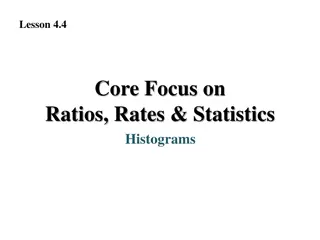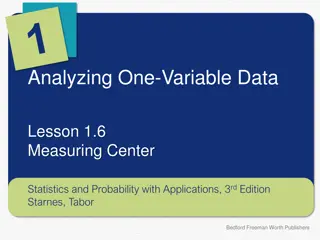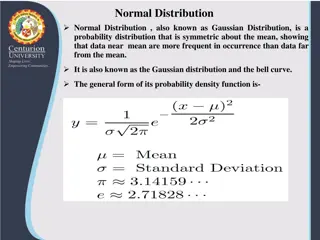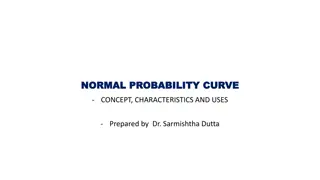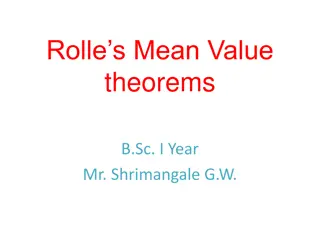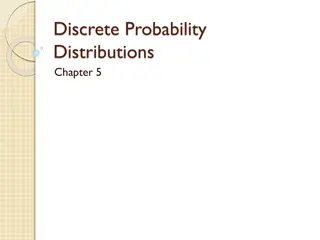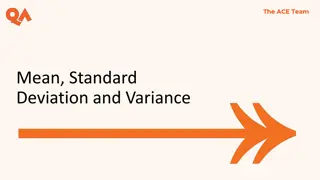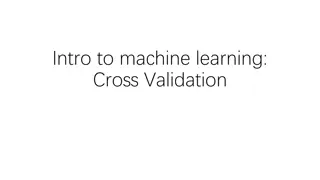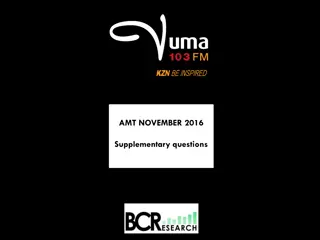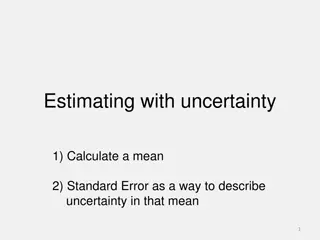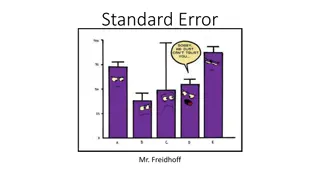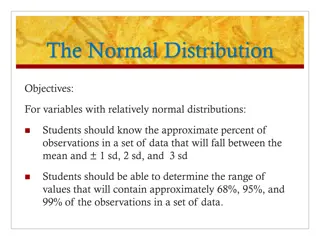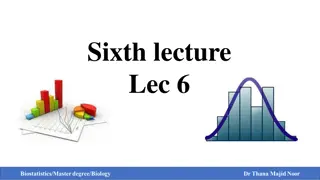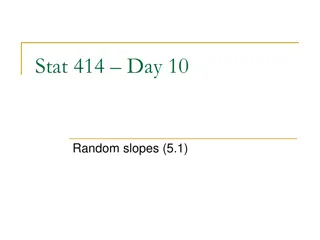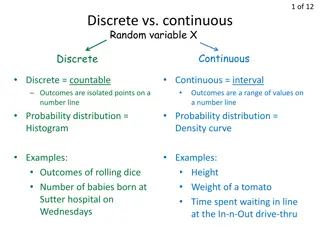Understanding Robust Estimation Methods for Handling Outliers in Data Analysis
This content delves into the importance of robust estimation in dealing with outliers in data analysis. It covers topics such as moving averages, the impact of outliers, reasons for outlier occurrence, and the robustness of median compared to mean calculations. Additionally, it explores moving media
1 views • 34 slides
Understanding Mean Effective Pressure in Internal Combustion Engines
Mean Effective Pressure (MEP) is a crucial parameter in internal combustion engines, representing the average pressure exerted on the piston during the power stroke. MEP is relatively consistent for specific engine types, making it a useful predictor of torque output based on engine type and displac
10 views • 20 slides
Earth-GRAM Overview and Updates 2023
Earth-GRAM is a global reference atmospheric model providing monthly mean and standard deviation data for various atmospheric variables. It is used in engineering for dispersion simulations but is not a forecasting model. Updates to Earth-GRAM include the Modern Era Retrospective Analysis, a global
0 views • 19 slides
Understanding Histograms: Ratios, Rates & Statistics
Explore the world of histograms to analyze data sets efficiently. Learn how to interpret dot plots, find mean, median, and mode, and create histograms. Understand key terms like frequency tables and intervals. Practice identifying the range of data, calculating mean values, and reading histograms ef
0 views • 15 slides
Understanding Mean, Median, and Mode in Data Analysis
Explore the concepts of mean, median, and mode in data analysis through engaging visuals and interactive exercises. Learn about the different types of averages, how to calculate them, and their significance in understanding datasets. Practice finding the mean of various sets of data and solve real-w
0 views • 10 slides
Understanding the Six Minute Walk Test for Assessing Functional Exercise Capacity
The Six Minute Walk Test (6MWT) is a valuable field test widely used in assessing functional exercise capacity in patients with pulmonary or cardiac compromise. It is safe, reliable, and provides valuable insights such as peak VO2 measurements. The test has shown good repeatability and reproducibili
1 views • 8 slides
Analysis of Gender Pay Gap Reporting at Oxford Health NHS FT as of March 2019
The Gender Pay Gap report at Oxford Health NHS FT covers key aspects including mean and median gender pay gaps in hourly pay, bonus gaps, proportion of employees receiving bonuses, and proportion of males and females in each pay quartile. The report also highlights workforce gender distribution, Age
0 views • 17 slides
Understanding Measures of Center in Data Analysis
This lesson explores the concept of measuring the center of a distribution of quantitative data using the median and the mean. It covers how to find and interpret the median, calculate the mean, compare both measures, and choose the appropriate measure of center. Practical examples and explanations
0 views • 15 slides
Understanding Measures of Central Tendency in Statistics
Measures of central tendency, such as mean, median, and mode, provide a way to find the average or central value in a statistical series. These measures help in simplifying data analysis and drawing meaningful conclusions. The arithmetic mean, median, and mode are commonly used to represent the over
0 views • 11 slides
Understanding Hypertension: Types, Pathogenesis, and Management
The article discusses the physiological basis, types, pathogenesis, and genetic predisposition of hypertension. It explains the revision of terminology related to blood pressure and the calculation of mean arterial pressure. Secondary hypertension, causes, and mean arterial pressure determination ar
0 views • 29 slides
Understanding Measures of Central Tendency in Statistics
Measures of central tendency, such as mean, median, and mode, play a crucial role in statistical analysis by describing the central position in a dataset. Mean represents the average, median is the middlemost value, while mode is the most frequent value. Learn about their significance, calculation m
2 views • 12 slides
Master Mean Calculation from Frequency Tables with Hegarty Maths
Enhance your statistical skills by learning how to calculate the mean from a frequency table in lessons 3 and 4. Follow along with the provided images, watch the instructional video, attempt practice questions, and assess your understanding with a quiz on Hegarty Maths.
1 views • 8 slides
Understanding Knudsen Diffusion in Mass Transfer Operations
Molecular diffusion involves the movement of individual molecules through a substance due to their thermal energy. Knudsen diffusion occurs in very fine pores at low pressure where the molecule's mean free path exceeds the pore diameter, affecting diffusion rates. The Knudsen number is used to measu
1 views • 12 slides
Understanding Normal Distribution and Its Business Applications
Normal distribution, also known as Gaussian distribution, is a symmetric probability distribution where data near the mean are more common. It is crucial in statistics as it fits various natural phenomena. This distribution is symmetric around the mean, with equal mean, median, and mode, and denser
1 views • 8 slides
Dealing with Range Anxiety in Mean Estimation
Dealing with range anxiety in mean estimation involves exploring methods to improve accuracy when estimating the mean value of a random variable based on sampled data. Various techniques such as quantile truncation, quantile estimation, and reducing dynamic range are discussed. The goal is to reduce
1 views • 12 slides
Insights into the Mean Value Theorem and Its Applications
Delve into the Mean Value Theorem (MVT) with a focus on concepts like Lagrange's MVT, Rolle's Theorem, and the physical and geometrical interpretations. Explore the conditions, statements, and special cases of MVT, along with practical applications and geometric insights. Dr. Arnab Gupta, an Assista
0 views • 14 slides
Understanding Measures of Variability: Variance and Standard Deviation
This lesson covers the concepts of variance and standard deviation as measures of variability in a data set. It explains how deviations from the mean are used to calculate variance, and how standard deviation, as the square root of variance, measures the average distance from the mean. Degree of fre
1 views • 26 slides
Understanding Standard Deviation in National 5 Mathematics
Standard deviation measures the spread of data around the mean, indicating how close or far apart values are from the average. This concept is crucial in analyzing data variability and consistency, with lower values signifying data clustered around the mean and higher values indicating greater dispe
3 views • 12 slides
Understanding the Normal Probability Curve
The Normal Probability Curve, also known as the normal distribution, is a fundamental concept in statistics. It is symmetric around the mean, with key characteristics such as equal numbers of cases above and below the mean, and the mean, median, and mode coinciding. The curve's height decreases grad
0 views • 10 slides
Descubra o poder do Mean Well em Meanwellbrasil.com.br. Qualidade e
Descubra o poder do Mean Well em Meanwellbrasil.com.br. Qualidade e confiabilidade aliadas a um atendimento excepcional ao cliente. Junte-se \u00e0 fam\u00edlia Mean Well hoje!
3 views • 1 slides
Contractions of Tropical Precipitation Under Global Warming
Aaron Donohoe's research focuses on the contraction of tropical precipitation with global warming, emphasizing the zonal mean and its implications for climate models. The results show a robust contraction and intensification of tropical precipitation in a warmer world. The width of tropical precipit
0 views • 12 slides
Distribuidor Mean Well | Meanwellbrasil.com.br
Compre em Meanwellbrasil.com.br, distribuidor l\u00edder da Mean Well com uma ampla sele\u00e7\u00e3o de fontes de alimenta\u00e7\u00e3o de alta qualidade. Confie em n\u00f3s para todas as suas necessidades eletr\u00f4nicas.
2 views • 1 slides
Understanding Fair Distribution of Sweets: Analysis & Comparison
Explore the concept of fair distribution through sweets, assessing mean, median, and variability. Engage in activities to make distributions fair by moving items and determining the most equitable distribution among different scenarios. Analyze various distributions of sweets among students and iden
1 views • 35 slides
Understanding Rolle's Mean Value Theorem in Calculus
Rolle's Mean Value Theorem states that if a function is continuous in a closed interval, differentiable in the open interval, and the function values at the endpoints of the interval are equal, then there exists at least one point where the derivative of the function is zero. This theorem is verifie
0 views • 11 slides
Advanced Imputation Methods for Missing Prices in PPI Survey
Explore the innovative techniques for handling missing prices in the Producer Price Index (PPI) survey conducted by the U.S. Bureau of Labor Statistics. The article delves into different imputation methods such as Cell Mean Imputation, Random Forest, Amelia, MICE Predictive Mean Matching, MI Predict
0 views • 22 slides
Understanding Bullying: Behavior Differentiation and Impact
Discussing the importance of addressing bullying in schools based on statistics and the need to distinguish between rude, mean, and bullying behaviors. The content outlines examples of rude, mean, and bullying behaviors, emphasizing the intentional and repeated nature of bullying, its impact, and ex
0 views • 20 slides
Understanding Discrete Probability Distributions
Explore the definition of random variables, probability distributions, and three types of discrete distributions - Binomial, Hypergeometric, and Poisson. Learn about the mean, variance, and standard deviation of probability distributions, as well as the difference between discrete and continuous dis
3 views • 32 slides
Understanding Descriptive Statistics: Mean, Standard Deviation, and Variance
Explore the fundamentals of descriptive statistics focusing on mean, standard deviation, and variance. Dive into the importance of these measures in interpreting data patterns effectively, with practical examples like analyzing the average height of individuals and understanding central tendency met
1 views • 23 slides
Understanding Cross-Validation in Machine Learning
Cross-validation is a crucial technique in machine learning used to evaluate model performance. It involves dividing data into training and validation sets to prevent overfitting and assess predictive accuracy. Mean Squared Error (MSE) and Root Mean Squared Error (RMSE) quantify prediction accuracy,
0 views • 19 slides
Cultural and Music Trends in AMT November 2016
Explore the cultural and music preferences of respondents in AMT November 2016. The data includes stations associated with music played, mean scores on cultural statements, and family statement mean scores for total, female, and male respondents. Discover insights into the importance of tradition, l
0 views • 30 slides
Calculating Mean and Standard Deviation of Data Sets
Learn how to find the mean and standard deviation of a set of numbers using a calculator. Follow step-by-step instructions with accompanying images to understand the process. Additionally, an example is provided to calculate the mean and standard deviation of monthly salaries based on a frequency ta
1 views • 13 slides
Understanding Arithmetic Mean Calculation Methods
Arithmetic mean can be calculated in individual, discrete, and continuous series. In individual series, each item is listed separately, while in discrete and continuous series, items are grouped with frequencies. The mean can be computed using formulas tailored to each type of series, including meth
0 views • 4 slides
Understanding Uncertainty with Estimation and Standard Error
Explore the concept of estimating with uncertainty, focusing on calculating a mean and using standard error to describe the uncertainty in that mean. Delve into human height, a variable described by a normal distribution, to understand how samples may deviate from the true mean. Discover sampling er
0 views • 13 slides
Understanding Standard Error of the Mean in Statistics
Statistical measures like standard error of the mean (SEM) help assess how closely a sample average represents the true population mean. Smaller SEM indicates more significant data with large sample sizes and low variation, while larger SEM signifies less significant data with small sample sizes and
0 views • 8 slides
A Tutorial on Object Tracking using Mean Transform in Visual Applications
Introduction to object tracking in videos, discussing challenges such as scale, orientation, and location changes. Motivation behind target tracking in surveillance and virtual reality applications. Explanation of a method using sparse coding to modify mean-shift for handling changes in location, sc
0 views • 30 slides
Understanding the Normal Distribution in Data Analysis
The normal distribution, also known as the bell-shaped or Gaussian distribution, is defined by the mean and standard deviation of quantitative data. It helps determine the range of values containing specific percentages of observations. Identifying frequency, probability, mean, and the relationship
0 views • 19 slides
Understanding mean, median, and mode in statistics
In statistics, the mean represents the average value, the median is the middle value that divides a dataset into two halves, and the mode is the most frequent value. This guide explains how to calculate these statistical measures and provides examples. Additionally, it demonstrates how to estimate t
0 views • 11 slides
Understanding Measures of Central Tendency in Statistics
Measures of central tendency, such as mean, median, and mode, play a crucial role in statistics by indicating the central position of a data set. Mean is the average, while median is the middle value when data is arranged in order. These measures provide insights into data distribution, with mean ca
2 views • 12 slides
Understanding Random Slopes in Data Analysis
Exploring the impact of grand-mean and group-mean centering on intercept interpretation with random slopes, as well as variations in slope/intercept covariance. Differentiating between fixed and random coefficients, and the effects of adding group mean as a Level 2 variable. Delving into within vs.
0 views • 21 slides
Understanding Random Variables and Mean in Statistics
Random variables can be discrete or continuous, with outcomes represented as isolated points or intervals. The Law of Large Numbers shows how the mean of observed values approaches the population mean as the number of trials increases. Calculating the mean of a random variable involves finding the e
0 views • 13 slides



